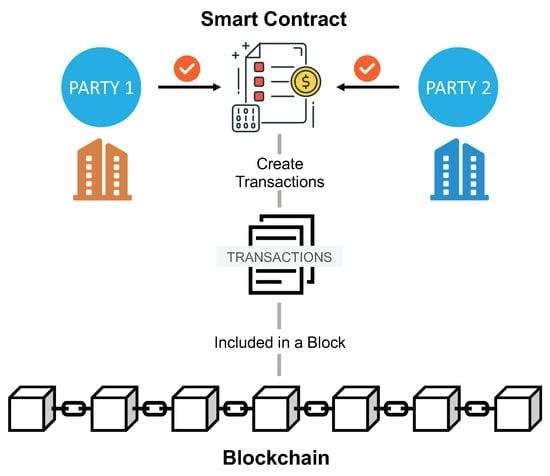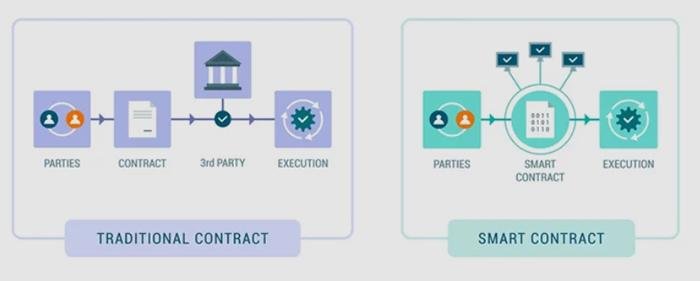How Smart Contracts Are Revolutionizing Real Estate Law

Introduction
Real estate is going through a major transformation thanks to digital technology, particularly the rise of smart contracts. These are self-executing agreements powered by blockchain technology, which automatically carry out the terms of a deal when certain conditions are met. They’re not just a new tech trend; smart contracts are set to change how property transactions are done by making them faster, more secure, and more transparent. This article looks at how smart contracts are breaking down barriers in real estate, reshaping the legal landscape, and creating both opportunities and challenges for those involved in property deals. Whether you’re an investor, a future homeowner, or a legal expert, understanding these changes is essential for navigating the future of property transactions.

The Emergence of Smart Contracts in Real Estate Deals
Smart contracts are revolutionizing the way real estate deals are made. These automated contracts run on blockchain technology, allowing buyers and sellers to complete transactions without middlemen like agents or lawyers. Once the terms are agreed upon, the contract automatically enforces them. This process brings key benefits:
- Efficiency: Transactions happen faster, with fewer steps and less paperwork.
- Cost Savings: Since fewer intermediaries are involved, transaction costs drop.
- Security: Blockchain technology makes the contract secure and prevents tampering.
As more real estate professionals adopt smart contracts, they’re using them to simplify everything from property listings to closing deals. For example, smart contracts can:
- Manage Escrow: Automatically hold and release deposits when the agreed conditions are met.
- Transfer Titles: Simplify the transfer of property ownership by verifying and securing title records.
- Rental Agreements: Automate rent payments when certain conditions (like a date or amount) are met.
Here’s how traditional methods compare to smart contract methods:
| Aspect | Traditional Approach | Smart Contract Approach |
|---|---|---|
| Time to Close | Weeks to Months | Days |
| Intermediary Fees | High | Minimal |
| Risk of Fraud | High | Low |
Read Also: The Role of Blockchain in Verifying E-Discovery Data

Streamlining Property Transfers Through Automated Agreements
Smart contracts are making property transfers quicker and easier. In traditional real estate transactions, buyers and sellers go through piles of paperwork and long negotiations. But with smart contracts, these agreements are automatically executed once the conditions are fulfilled, reducing the chance for misunderstandings or disputes. Properties can change ownership with just a few clicks, and the entire process becomes faster and more trustworthy.
The benefits are clear:
- Transparency: All parties can see the same information in real-time.
- Efficiency: The process is faster with less paperwork.
- Security: Information stored on blockchain is encrypted and nearly impossible to alter.
- Cost-Effective: Fewer middlemen mean lower transaction fees.
Here’s how the process compares between traditional methods and smart contracts:
| Traditional Process | Smart Contract Process |
|---|---|
| Multiple documents to sign | Single digital contract executed |
| Manual verification procedures | Automatic verification via code |
| Possible delays in transactions | Instantaneous execution upon conditions met |

Enhancing Transparency and Reducing Fraud in Property Deals
Key advantages of using smart contracts in real estate include:
- Real-Time Updates: All parties can see changes as they happen.
- Trust: Since the contract is automated and executed by code, there’s no room for subjective interpretation.
- Easier Compliance: The blockchain records an audit trail, making it easier to meet legal requirements.
Moreover, smart contracts help fight fraud by eliminating manual handling, which can be a point of vulnerability. Since these contracts are triggered by specific conditions, it becomes much harder for fraudulent activities like document forgery or double-selling to occur. This makes real estate transactions more secure and trustworthy.
A quick comparison of traditional vs. smart contract benefits:
| Traditional Process | Smart Contract Process |
|---|---|
| Multiple intermediaries increase complexity | Automated processes streamline transactions |
| Higher potential for disputes | Clear, codified agreements limit misunderstandings |
| Time-consuming verification | Instant validation through blockchain |

Navigating the Legal Landscape: Best Practices for Adoption
As smart contracts become more common in real estate, it’s important for everyone involved to understand how they work. This includes making sure the legal terms are clear, protecting privacy, and ensuring the technology is secure. Working with tech-savvy legal professionals can help ensure that these digital agreements are drafted and implemented correctly. To reduce risks, here are some strategies to keep in mind:
- Research smart contracts and blockchain technology thoroughly.
- Collaborate with legal experts who understand both real estate law and technology.
- Keep security measures up-to-date to protect against cyber threats.
- Adhere to local, state, and federal laws to prevent legal complications.
Additionally, it’s important to educate everyone involved in the process about how smart contracts work. Buyers, sellers, and agents should have a basic understanding to ensure smooth transactions. Training sessions and educational resources can help with this.
Here’s a simple framework for training sessions:
| Session Topic | Duration | Target Audience |
|---|---|---|
| Introduction to Smart Contracts | 1 Hour | All Stakeholders |
| Legal Implications and Compliance | 1.5 Hours | Real Estate Agents & Lawyers |
| Security Best Practices | 1 Hour | Technical Teams |
| Case Studies and Real-life Applications | 2 Hours | All Stakeholders |
Future Outlook
As traditional real estate processes become more automated, smart contracts are emerging as a powerful tool for increasing clarity and efficiency in property transactions. These digital agreements, which are built on blockchain for transparency and security, are more than just a passing trend. They are set to transform the way property deals are done, reducing the chances of disputes, speeding up processes, and ensuring security.
Legal professionals, investors, and property owners must be ready to adapt to this change. While the shift may require learning and adjustment, the benefits are clear: smart contracts make the path to property ownership smoother, more accessible, and more trustworthy.
The future of real estate law is bright, and as smart contracts continue to evolve, we are only beginning to realize their full potential. By embracing these innovations, we can shape a more efficient and secure real estate market for everyone.

















































































































































































































































































































































































































































































































































